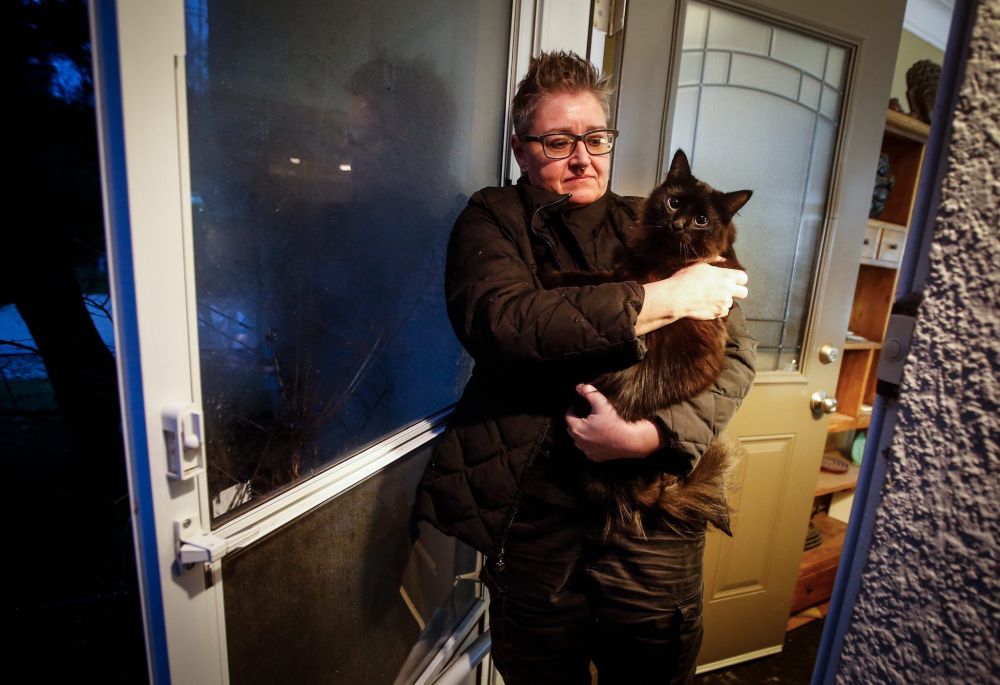A Winnipeg woman says the health-care system is ready to abandon her seriously ill partner, who is incoherent and prone to falls, as he battles late-stage liver failure from a hospital bed while waiting for a transplant.
Health-care advocates said the situation afflicting Lisa Fawchuk and Craig Schaefer, who has been in the Grace Hospital since late October after falling and hitting his head, highlights widespread staffing shortages that make it difficult for families to access home care.
Schaefer cannot safely walk, has difficulty feeding himself and is prone to infections, confusion and erratic behaviour. Despite those problems, Fawchuk said the hospital has wanted to discharge him into her care since Nov. 3.

JOHN WOODS / FREE PRESS
Lisa Fiwchuk is concerned a city hospital is pushing to discharge her critically ill husband who has late stage liver failure but is still waiting for a transplant.
“He may very well be at the end of his life,” Fawchuk said Tuesday, her voice wracked with sobs.
“I want him safe and comfortable, but it’s the hospital insisting he go home with me. He is not — in any way, shape or form — able to live in anyone’s home without 24-hour care.”
Schaefer, who will celebrate his 60th birthday this week, suffers from advanced non-alcoholic cirrhosis of the liver. He has hepatic encephalopathy — a condition in which the brain fills with ammonia, which impairs mental status, personality and motor functions, Fawchuk said.
She said Schaefer, who has been on the transplant list since October, may be a danger to himself and to others. His condition has required he be hospitalized several times since then; he has wandered away from care, started fires and tried to drive while in a fugue state, she said.

Schaefer has also slipped away from the hospital on multiple occasions, including once in September when he walked for several miles before falling and hitting his head, she said.
Fawchuk requested home care support last spring, but said she has received no help.
“If the hospital can’t even care for him, how can I? Home care would have helped him in May, June and July, but we are beyond that now,” she said.
“There is a big piece missing in health care for people with these types of things going on and I’m done being quiet… If this is happening to him, this is happening to other people, too, and it’s not right.”
Speaking on behalf of the Manitoba Health Coalition, Darlene Jackson said staffing shortages in support jobs have made such situations more common.
“We are in a situation where our home care supports are very limited in the community… many individuals are waiting for home care to be put in place without the adequate staff to provide those supports,” she said.
Jackson, who is also the president of the Manitoba Nurses Union and a former nurse, said it’s likely every region in the province is up against a lack of capacity in home care.
She said there is pressure to free up space at hospitals, which forces some patients out without adequate support at home.
“I think it’s important that we bolster our staff in home care. That’s one of the ways that we are going to shorten our wait times and free up those beds,” Jackson said. “That’s part of the puzzle.”
About 25,000 health-care support workers, represented by the Canadian Union of Public Employees of Manitoba and the Manitoba Government and General Employees’ Union, ratified a new contract last month. It includes an average wage increase of 27 per cent over four years and an increase in the starting wage for positions that have a high vacancy rate.
Union leaders spoke out about vacancy rates for months as the two sides bargained; MGEU president Kyle Ross had said the crisis was near the dangerous level and was threatening the quality of care.
The deal, and other recent improvements to the health system, are steps in the right direction, but there remains a “very long way to go,” Jackson said.
A spokesperson from the Winnipeg Regional Health Authority said physicians, care teams and family members are involved in discharge planning for every patient.
“The love of my life is dying and all I have left is maybe a bit of time with him… People shouldn’t need to advocate for humane care.”– Lisa Fawchuk
“While we are very limited in what we can comment on in individual cases, we can confirm that the care team at Grace Hospital is aware and sensitive to the concerns raised by the patient’s caregivers in this situation. The care team continues to have conversations with caregivers on confirming a safe and sustainable plan moving forward,” the spokesperson said.
“Health-care providers recognize that facing health-care issues and the related care planning can be stressful, frightening and at times overwhelming for patients and their caregivers.”
The WRHA encouraged any patient or family member with concerns about their care to contact the involved hospital’s patient relations team.
Fawchuk said she has not spoken with patient relations staff at the Grace.
She said her home has not been assessed to determine whether it is safe for Schaefer to stay there.
Fawchuk and Schaefer’s family are set to meet with hospital staff Wednesday.
“The love of my life is dying and all I have left is maybe a bit of time with him. I shouldn’t have to spend it fighting, and going to interviews and begging the government… People shouldn’t need to advocate for humane care.”
Fawchuk said Schaefer was a courier for Purolator for nearly 20 years before his health issues forced him to stop around two years ago. He enjoys cooking, play the guitar and being with his cats and dogs.
There is a possibility he will be selected as a recipient for a liver transplant at any time, in which case he will be required to travel to Toronto for surgery, she said.
He had been selected for a transplant on the day he fell and hit his head in October, but he was unable to make the journey to Ontario due to the injury. Fawchuk fears the same situation may happen again if he is discharged.
tyler.searle@freepress.mb.ca

Tyler Searle
Reporter
Tyler Searle is a multimedia producer who writes for the Free Press‘s city desk. A graduate of Red River College Polytechnic’s creative communications program, he wrote for the Stonewall Teulon Tribune, Selkirk Record and Express Weekly News before joining the paper in 2022. Read more about Tyler.
Every piece of reporting Tyler produces is reviewed by an editing team before it is posted online or published in print — part of the Free Press‘s tradition, since 1872, of producing reliable independent journalism. Read more about Free Press’s history and mandate, and learn how our newsroom operates.
Our newsroom depends on a growing audience of readers to power our journalism. If you are not a paid reader, please consider becoming a subscriber.
Our newsroom depends on its audience of readers to power our journalism. Thank you for your support.